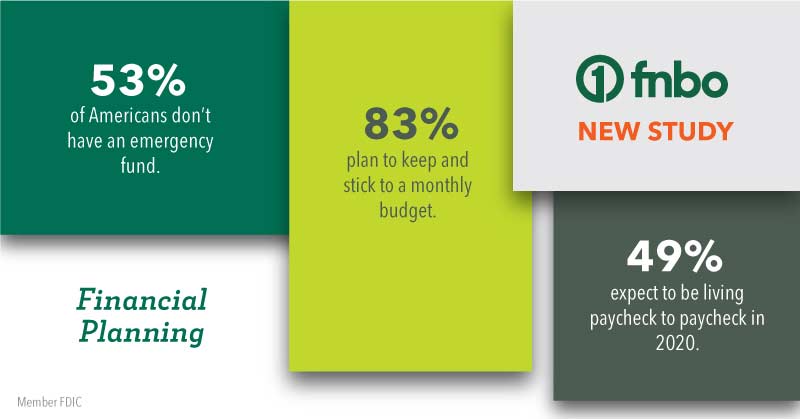FDIC-Insured - Backed by the full faith and credit of the U.S. Government
-
-
-
FNBO Newsroom
Date Published: February 19, 2020
-

Press Release
Release Date: February 19, 2020
Study: 53% of U.S. Adults Don’t Have Emergency Fund
—2020 ‘Financial Planning’ Survey Data Released by First National Bank of Omaha—
PLUS: NEARLY HALF OF ADULTS EXPECT TO BE LIVING ‘PAYCHECK TO PAYCHECK’
OMAHA, Neb. February 19, 2020—First National Bank of Omaha (FNBO) today released the results of its 2020 Financial Planning Survey, which examined Americans’ financial plans, expectations, goals and concerns for the year ahead—covering topics from saving, budgeting and taxes to charitable giving and the stock market.
According to the survey, 49% of U.S. adults say they expect to be living paycheck to paycheck in 2020, and 53% reveal they do not have an emergency fund that covers at least three months of expenses. Meanwhile, 91% say better money habits is a goal for 2020, and 83% say they plan to keep and stick to a monthly budget.
“As the personal finance landscape continues to evolve—with online banking, automated tools and digital resources all playing a larger role for consumers—the same enduring principles continue to apply: plan, budget and save,” said Jerry J. O’Flanagan, executive vice president, First National Bank of Omaha. “For individuals and families in the early stages of saving, building that emergency fund should always be a top priority, and using a high-yield savings account is often the best way to do that.”
Among the survey’s additional findings on respondents’ plans, expectations and goals for 2020:
- EARNING AND SAVING: 59% say they expect to earn more, and 63% say they expect to save more.
- GIVING: 29% say they plan to do more charitable giving, while 11% say less.
- RETIREMENT: 37% say they will not be saving for retirement.
- STOCKS: 31% say they expect the stock market to perform better, while 21% say worse.
- TAXES: 62% say they are expecting a tax refund, while 15% say they are expecting to owe money.
- BUDGETING: 83% say they plan to keep and stick to a monthly budget.
- FINANCIAL ADVISOR: 26% say they have a financial advisor.
Further, 42% say their most relied upon personal finance resource is a spouse or family member. “While having trusted family members you can go to regarding financial matters serves an important role, our survey shows there is an opportunity for banks and financial professionals to fill that need for advice and guidance,” said O’Flanagan.
When respondents were asked about their biggest financial priority for 2020, the most popular response was increasing savings (32%), followed by setting and sticking to a budget (29%), paying off non-student loan debt (12%), contributing to retirement (10%), paying off student loan debt (7%), the purchase of a big-ticket item (6%) and investing in the stock market (3%).
This survey is a follow-up to First National Bank of Omaha’s 2019 Savings Survey, in which 63% of recipients said they do not set annual saving goals.
METHODOLOGY
This survey was conducted online using Survey Monkey among a national sample of 1,067 adults spanning across U.S. geographic regions and income levels. The survey sample was weighted to reflect the gender distribution and the age distribution across the 18-44 and 45+ age brackets in U.S. census data.
The articles in this blog are for informational purposes only and not intended to provide specific advice or recommendations. When making decisions about your financial situation, consult a financial professional for advice. Articles are not regularly updated, and information may become outdated.
